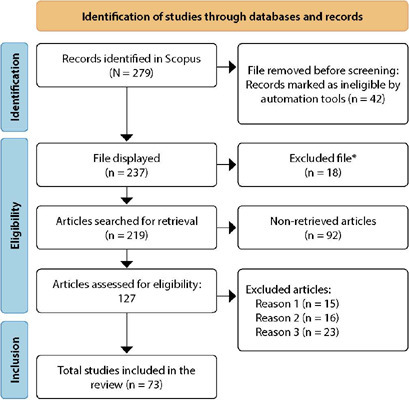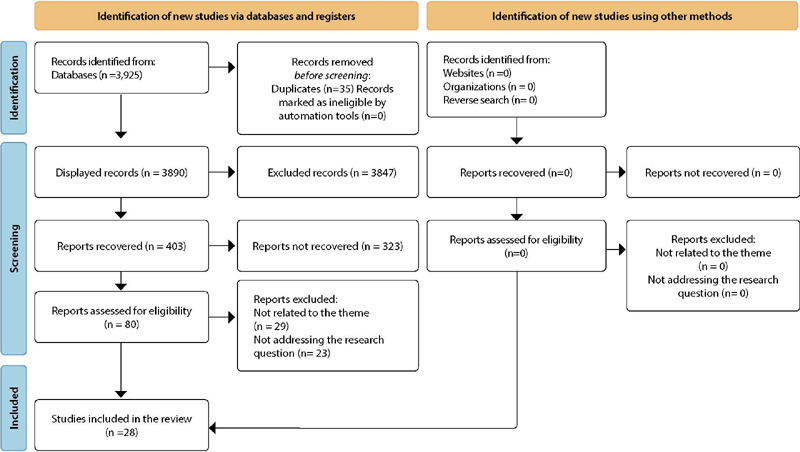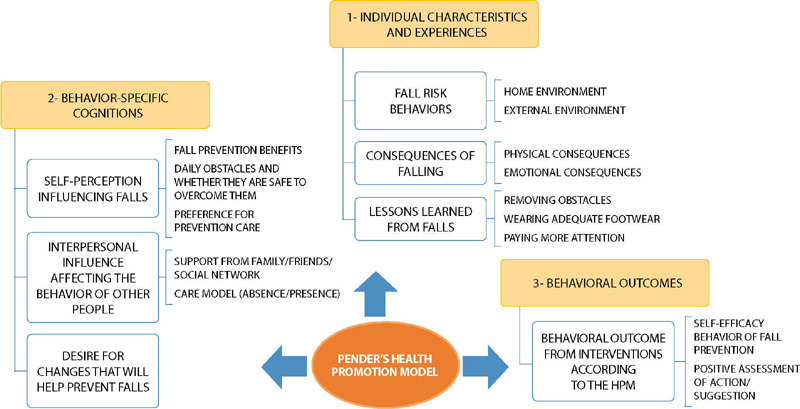-
REVIEW06-14-2024
Critical analysis of the scientific production on Jean Watson’s Theory of Human Care
Revista Brasileira de Enfermagem. 2024;77(2):e20230231
Abstract
REVIEWCritical analysis of the scientific production on Jean Watson’s Theory of Human Care
Revista Brasileira de Enfermagem. 2024;77(2):e20230231
DOI 10.1590/0034-7167-2023-0231
Views0See moreABSTRACT
Objectives:
to analyze current scientific production on the use of the theoretical-methodological precepts of Jean Watson’s Theory of Human Care/Clinical Caritas Process.
Methods:
quantitative, exploratory, descriptive study using data from 1979 to 2023 in the Scopus database. Analysis was carried out using VOSviewer software.
Results:
the 73 studies included establish a network of collaboration among 221 authors from 155 institutions in 18 countries, who discuss the development of ethical behavior in nursing staff, through technical improvement, implementation, and validation of instrumental strategies capable of measuring and evaluating the quality of holistic and empathetic care. The Theory of Human Caring contributes to nursing training and care, and Process Clinical Caritas-Veritas is useful for the different possibilities of practice and education.
Conclusions:
it is important to strengthen with more empirical data a nursing work model centered on individual human care, supporting the evolution of scientific nursing knowledge.

-
ORIGINAL ARTICLE06-14-2024
Mid-range theory of the nursing diagnosis Overweight
Revista Brasileira de Enfermagem. 2024;77(2):e20230372
Abstract
ORIGINAL ARTICLEMid-range theory of the nursing diagnosis Overweight
Revista Brasileira de Enfermagem. 2024;77(2):e20230372
DOI 10.1590/0034-7167-2023-0372
Views0See moreABSTRACT
Objective:
To build a mid-range theory for the nursing diagnosis Overweight in adolescents and young adults.
Methods:
A methodological study in the light of the theoretical frameworks of Roy and of Lopes, Silva and Herdman. A total of 3,925 articles were retrieved and assessed using the State of the Art Through Systematic Review software. The final sample consisted of 28 articles.
Results:
The findings converged to 3 essential attributes, 13 antecedents, and 7 consequences. A mid-range theory was built consisting of an illustrated diagram, 11 propositions, and 12 causal relationships.
Final considerations:
From the creation of the theory, it was possible to better understand the nursing diagnosis Overweight within the context of adolescents and young adults. Understanding nursing phenomena contributes to nursing science’s advancement and strengthening.

-
EXPERIENCE REPORT11-27-2023
Implementation of a nursing strategy for self-transcendence in older adults: an experience report
Revista Brasileira de Enfermagem. 2023;76(5):e20220745
Abstract
EXPERIENCE REPORTImplementation of a nursing strategy for self-transcendence in older adults: an experience report
Revista Brasileira de Enfermagem. 2023;76(5):e20220745
DOI 10.1590/0034-7167-2022-0745
Views0See moreABSTRACT
Objectives:
to report the experience of implementing a nursing strategy to promote self-transcendence in older adults attended at a Primary Health Care center.
Methods:
an experience report on the implementation of a strategy addressing the Theory of Self-Transcendence by nursing to older adults in a primary health unit, in San Luis Potosí, Mexico, from October to November 2022.
Results:
fourteen older adults and three nurses participated. From the expression of feelings, speeches about self-transcendence, spirituality and physical activity promotion, the strategy was satisfactory. Emotional, cognitive and spiritual changes were observed in the different dimensions of the Theory of Self-Transcendence.
Final Considerations:
the nursing strategy on self-transcendence made it possible to identify significant moments that helped to identify the key points in which older adults were; it helped to intervene from a person-to-person care perspective.
-
ORIGINAL ARTICLE10-09-2023
Spirituality in the uncertainty of illness: the perspective of oncology patients
Revista Brasileira de Enfermagem. 2023;76(4):e20220712
Abstract
ORIGINAL ARTICLESpirituality in the uncertainty of illness: the perspective of oncology patients
Revista Brasileira de Enfermagem. 2023;76(4):e20220712
DOI 10.1590/0034-7167-2022-0712
Views0See moreABSTRACT
Objective:
To analyze spirituality in the process of illness uncertainty in cancer patients.
Methods:
This is a qualitative study, in which Merle Mishel’s Theory of Uncertainty of Disease was used as a theoretical framework; and as a methodological reference, the stages of Bardin’s Content Analysis. As a technique for obtaining information, a semi-structured interview was used.
Results:
Spirituality in the uncertainty of the disease varies from patient to patient and acts in a unique way. They presented readaptation attitudes in their reports. The presence of spirituality in their lives acted as the main force mechanism to deal with the uncertainty of the disease, and this moment was called by Mishel “probabilistic thinking”.
Conclusion:
Patients demonstrated readaptation attitudes in their reports, and spirituality acted as the main mechanism of strength to deal with uncertainty in the disease

-
REVIEW10-06-2023
Nursing theories in the care of stroke patients: a scoping review
Revista Brasileira de Enfermagem. 2023;76(5):e20220791
Abstract
REVIEWNursing theories in the care of stroke patients: a scoping review
Revista Brasileira de Enfermagem. 2023;76(5):e20220791
DOI 10.1590/0034-7167-2022-0791
Views0See moreABSTRACT
Objectives:
to map and synthesize nursing theories and conceptual frameworks that have been applied in the practice of nursing care for stroke patients in hospital settings.
Methods:
a scoping review was conducted in October 2022 using the MEDLINE (accessed via PubMed), CINAHL, Scielo, and Web of Science databases, following The Joanna Briggs Institute guidelines.
Results:
nine studies incorporated six nursing theories and three conceptual frameworks, which were employed to enhance stroke patient care. The objective of these theories and conceptual frameworks was to facilitate the identification of the patient’s psychobiological, psychosocial, and psychospiritual needs, elucidate the nurse’s role and expand their perspective on rehabilitation, and acknowledge the survivor’s process of transition.
Final Considerations:
this mapping exercise identified major nursing theories, middle-range theories, and conceptual frameworks applied to the care of stroke patients.

-
EXPERIENCE REPORT10-24-2022
Nursing process for elderly women susceptible to falls from the perspective of the Pender’s Model
Revista Brasileira de Enfermagem. 2022;75:e20210913
Abstract
EXPERIENCE REPORTNursing process for elderly women susceptible to falls from the perspective of the Pender’s Model
Revista Brasileira de Enfermagem. 2022;75:e20210913
DOI 10.1590/0034-7167-2021-0913
Views0See moreABSTRACT
Objectives:
to describe the strategy of applying the nursing process guided by Pender’s Health Promotion Model to elderly women susceptible to falls with a view to promoting a self-efficacy behavior for fall prevention.
Methods:
application of the nursing process to eleven elderly women who had already experienced falls, living in a neighborhood in the outskirts of Belem, state of Pará, which involved interviews to obtain their nursing history and group meetings using the focus group technique to develop the other phases of the nursing process: nursing diagnosis, nursing interventions, and nursing assessment.
Results:
despite the risk factors for falls, the intervention model adopted in this study allowed elderly women to enhance their self-efficacy.
Final Considerations:
the model proved to be suitable for the participation of elderly women in actions to build fall prevention behaviors, with a view to healthier lifestyles.

-
ORIGINAL ARTICLE07-29-2022
Adolescent health in the Covid-19 pandemic: a construction through Nola Pender’s model
Revista Brasileira de Enfermagem. 2022;75(6):e20210696
Abstract
ORIGINAL ARTICLEAdolescent health in the Covid-19 pandemic: a construction through Nola Pender’s model
Revista Brasileira de Enfermagem. 2022;75(6):e20210696
DOI 10.1590/0034-7167-2021-0696
Views0See moreABSTRACT
Objective:
To construct perspectives of adolescent health in the face of the Covid-19 pandemic, through emancipatory dialogues guided by Nola Pender’s Model.
Method:
This is a participatory research based on the methodology of Psychodramatic Pedagogy of María Alicia Romaña. The action was carried out with 17 school-aged adolescents from a city in the Center-West Region of Brazil. The theoretical-analytical framework used was Nola Pender’s Health Promotion Model, and the data collected were discussed based on Paulo Freire’s dialogical framework.
Results:
The workshop allowed the sharing of individual characteristics and experiences of adolescents regarding the reality experienced in the pandemic, highlighting mental health as a main theme for health promotion.
Final considerations:
It was construct, along with the adolescents, important knowledge about health in the pandemic, supporting the thematic reflection and the elaboration of timely health promotion interventions.





